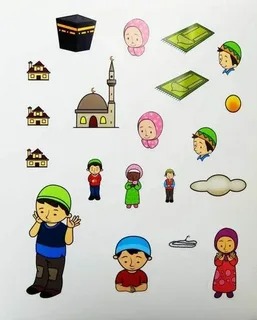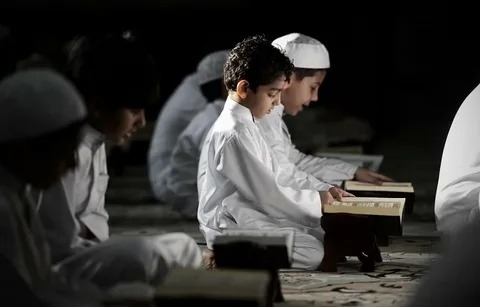In today’s fast-paced world, imparting valuable knowledge and moral values to our children is of utmost importance. Islamic studies for kids play a vital role in instilling a strong foundation of faith, character, and understanding of their religion from a young age. in This article on Arabian Tongue we will explores the top 5 Islamic studies for kids that can help parents and educators nurture the next generation of Muslims.
Why Islamic Studies for Kids Matter

Islamic studies for kids serve as the cornerstone for a child’s spiritual and moral development. It’s during these formative years that children are like sponges, absorbing knowledge, values, and behaviors. By introducing them to Islamic studies early on, parents and educators can instill a sense of identity, purpose, and compassion in their hearts.
Top 5 Islamic Studies for Kids

Selecting the appropriate curriculum is paramount when it comes to teaching Islamic studies to children. It should be engaging, age-appropriate, and align with the child’s level of understanding. Let’s delve into the top five areas of Islamic studies for kids:
1. Quranic Studies
A. Learning to Read the Quran: One of the first steps in Quranic studies is teaching kids how to read the Quran. Many programs offer interactive lessons and games to make this process enjoyable and effective.
B. Understanding Quranic Stories: Learning about the stories in the Quran can be fascinating for kids. These stories impart valuable lessons of faith, patience, and resilience.
2. Hadith Studies
A. Introduction to Hadith: Hadith studies introduce kids to the sayings and actions of the Prophet Muhammad (peace be upon him). This knowledge helps them understand the practical aspects of Islam.
B. Learning Hadith Stories: Children can connect with the wisdom of the Prophet through engaging stories and discussions centered on his life and teachings.
3. Islamic History
A. The Lives of Prophets: Studying the lives of various prophets provides kids with role models to look up to. It teaches them about divine messages and the importance of following the path of righteousness.
B. The History of Islam: Exploring the history of Islam helps children understand the growth and impact of this faith throughout the ages.
4. Islamic Ethics and Morality
A. Developing Good Character: Instilling good character traits, such as honesty, kindness, and respect, is a fundamental part of Islamic studies for kids.
B. Practicing Kindness and Compassion: Teaching kids to be compassionate and empathetic towards others fosters a sense of community and unity within the Islamic faith.
5. Arabic Language
A. Learning the Basics: Understanding the Arabic language is essential for comprehending the Quran and Hadith. Basic language skills can open the door to a deeper connection with Islamic texts.
B. Arabic as a Sacred Language: Many kids find it inspiring to learn that Arabic is considered a sacred language in Islam. It adds an extra layer of significance to their studies.
The Benefits of Islamic Studies for Kids

Islamic studies, often referred to as “Islamic education,” encompass a wide range of subjects and teachings related to Islam. These studies go beyond religious rituals and prayers; they include a comprehensive understanding of the Quran, Hadith (sayings and actions of Prophet Muhammad), Islamic history, and ethics. Offering Islamic studies to children from a young age can have a profound impact on their personal and spiritual development:
Fostering Moral Values
One of the primary benefits of introducing Islamic studies to kids is the cultivation of strong moral values. Islamic teachings emphasize honesty, kindness, humility, and respect for others. Through stories from Islamic history and the Quran, children can learn valuable lessons about integrity and compassion.
Recommend: Internet safety measures for the Muslim parents and kids.
Strengthening Identity
In a world where cultural diversity is celebrated, it is crucial for children to have a strong sense of their identity. Islamic studies help children understand their cultural and religious heritage, promoting a sense of belonging and pride in their Muslim identity.
Building Strong Character
Islamic education focuses on character development. Children learn about the importance of patience, perseverance, and self-discipline. These qualities are essential for success in both their academic and personal lives.
Academic Excellence
Islamic studies are not limited to religious teachings; they encompass a wide range of subjects, including mathematics, science, and literature. This holistic approach to education can contribute to a child’s academic excellence by providing a well-rounded knowledge base.
Encouraging Critical Thinking
Islamic studies encourage children to think critically and ask questions. They are encouraged to seek knowledge and explore the world around them. This fosters intellectual curiosity and a lifelong love for learning.
Promoting Multilingualism
Islamic studies often involve learning Arabic, the language of the Quran. This can be beneficial as it promotes multilingualism and helps children appreciate the linguistic diversity of the world.
Strengthening Family Bonds
Studying Islam as a family can be a unifying experience. Parents and children can engage in discussions, read together, and attend religious events, which strengthens the bonds within the family unit.
Developing a Sense of Social Responsibility
Islamic teachings emphasize the importance of helping those in need and being socially responsible. Children who study Islam are more likely to engage in acts of charity and volunteerism, contributing positively to society.
Nurturing Spiritual Growth
Nurturing a child’s spiritual growth is a central aspect of Islamic studies. It allows children to develop a close connection with God and leads them to lead a life of purpose and meaning.
How to Make Learning Engaging
To ensure that kids stay engaged in their Islamic studies, parents and educators can incorporate interactive activities, storytelling, and discussions into the learning process.
Incorporating Islamic Studies into Daily Life
Making Islamic studies a part of daily life helps reinforce their importance. Regular prayers, recitation of Quranic verses, and acts of kindness can all be integrated seamlessly into a child’s routine.
FAQs
How can I motivate my child to study Islamic subjects?
Motivation often comes from making the learning experience enjoyable. Use games, stories, and positive reinforcement to keep your child engaged.
Are there online resources for teaching Islamic studies to kids?
Yes, there are many online platforms and apps specifically designed for teaching Islamic studies to children. These resources often include interactive lessons and videos.
What age should kids start learning about Islam?
Children can begin learning about Islam from a very young age, even as toddlers. The key is to use age-appropriate materials and methods.
Can non-Muslim children benefit from Islamic studies?
Yes, the values and moral teachings in Islamic studies can benefit children of all backgrounds by promoting tolerance, empathy, and respect for diverse cultures.
How can parents support their child's Islamic education?
Parents can support their child's Islamic education by actively participating in their learning, providing a positive and encouraging environment, and leading by example in their own practice of Islam.
Conclusion
In conclusion, Islamic studies for kids are essential for nurturing a strong foundation of faith, morality, and knowledge. By choosing the right curriculum and incorporating these studies into daily life, parents and educators can ensure that the next generation grows up with a deep understanding of Islam and its values.


